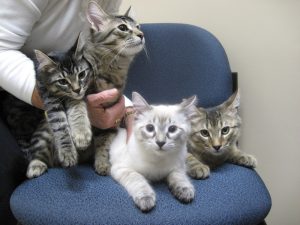In my last blog I talked about dogs and their behaviour, so this week I thought I would focus on kittens.
Kittens taken from their mother before 2 weeks of age can be fearful and overly aggressive towards humans and other cats. Adoption before 6 weeks of age is not recommended, however the socialization period is 3-9weeks of age, and research has shown that early handling may result in less fear-based behaviour toward humans allowing bonding with the family. It is encouraged to introduce the kittento as many different people and places as possible during this time and during its first year of life.
Make a safe place for your kitten. Allow the kitten to explore its new environment on a daily basis. Make sure your kitten is supervised and returned to its safe place frequently so it will learn where the litter box is. This can be anywhere in the home and it should include a bed, toys, food and water and litter box. The rule of thumb is one litter box per cat. Make sure the litter box is tailored for you kitten – easily accessible, away from busy areas and the sides are low. The food bowl and water bowl should not be side by side. If we think of cats in the wild, when they feed it’s messy and they don’t like to contaminate their water source. The water bowl should also be a larger bowl – like a small dog bowl. Cats like to see their reflection in their water source and they don’t like their whiskers touching the edge of the bowl (although some will drink out of the tiniest cups).
Play is important for kitten development. All play should occur with toys, never human hands or feet. This will help avoid injury to people. Predatory play behaviour is an integral part of kitten play. There are feeder toys that allow food to be dispensed through manipulation and play, mimicking a more natural feeding behaviour.
Scratching is a normal behaviour. Kittens need a scratching surface that is appropriately sized and different options should be provided ie. horizontal, vertical, carpet or sisal until the kitten decides its preference. A rule of thumb is to provide a scratching post that is tall enough so that the kitten can completely stretch out when standing on its hind legs with front legs outstretched. Location is essential when getting the kitten to use the provided scratching material. Place one preferred scratching surface in the safe place and another where it spends time with family. Sprinkle a little catnip on the post or mat to make it more attractive. If your kitten is scratching things you don’t want it to, you can use double-sided tape on furniture and plants or again make sure your kitten is supervised so you can discourage it from scratching in the wrong places (a squirt with water may help). Start this early with your kitten and then maybe it won’t be necessary to get them declawed.
Gentle handling techniques several times per week, like grooming with a soft brush, touching its feet and ears, opening its mouth, trimming 1 or 2 nails can also benefit your kitten. Pick a time when your kitten is quiet and relaxed and keep these handling sessions short. Always provide treats before, during and after sessions to help associate them with good things.
Kittenhood is the best time to get your kitten used to crates and car travel, making traveling to your veterinarian less stressful. Top opening crates facilitate easier entry and exit, however different crates are available. Leave the crate out and open. Treats and comfortable bedding should be placed inside. Praise and provide treats every time the kitten is in the crate. Kittens can also be trained to wear a harness and leash for safe outdoor exploration.
All the best, Dr. Fulop.
Source article: Clinician’s Brief July 2012.
An informative article on crate training can be found at catcouncil.com/programs/carriertraining.htmlA helpful crate-training video can be viewed at catalystcouncil.org/resources/video/?ld=102


Recent Comments